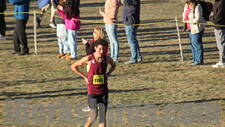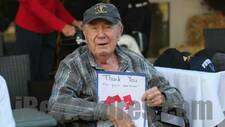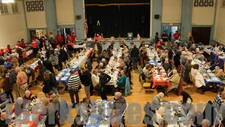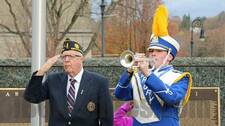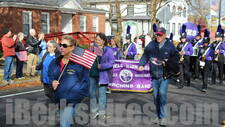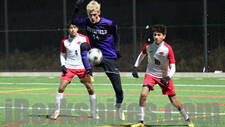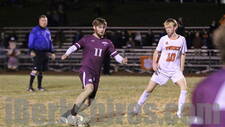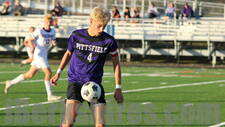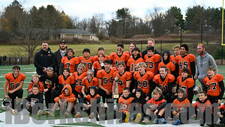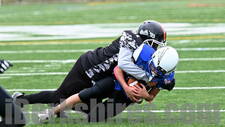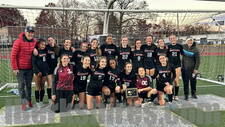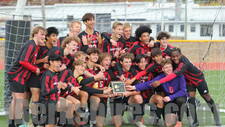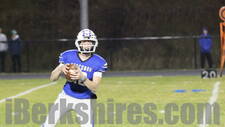Lost In These Conditions: Memories of David CohenBy Susan Bush
07:22AM / Thursday, June 14, 2007
 | | David Cohen is a World War II veteran who helped liberate Nazi concentration camps.[Photo by Sue Bush] |
Clarksburg - More than 60 years ago, 89-year-old David Cohen was among the first U.S. Army soldiers to liberate the Ohrdruf and Buchenwald concentration camps. Speaking during an interview last night, Cohen clearly recalled his first impressions of the camps.
"First of all, there is anger, and you don't speak," Cohen said. "What you see is unbelievable, unbelievable. And then what hits you is the smell. People think I am crazy but the smell, it still penetrates my nostrils."
The horrific physical condition of camp survivors was visually excruciating. And when local leaders of nearby towns tried to deny knowledge of the business of the camp, Cohen said he remembered a U.S. military colonel who refused to accept the denials.
"This colonel, he said to the man, 'You are a lying son of a *****,'" Cohen said. "He told this man, this mayor of a town, 'you'd know, you'd know by the smell.'"
Cohen was among the featured speakers during last night's "The Ruined and The Righteous: The Nazi Occupation of Europe 1933-1945" Holocaust exhibit at the Clarksburg Elementary School. Students of teacher Michael Little worked for weeks on exhibits and projects for the three-hour event. Over 200 individuals attended the exhibit.
The psychological impact of camp realities were overwhelming, Cohen said.
"I don't know how [camp inmates] survived," he said. "We had kids with us [military troops] who were 19, 20 years old and I saw crying.We had a doctor with us, he was from Brooklyn, and he started walking around like he was lost; he lost himself in these conditions, a mature doctor."
Most of the camp prisoners were male, Cohen said, and they "kissed our hands, our feet. They wanted food but we were told not to give them any."
The reason for food refusal was medical, Cohen said, and noted most of the camp prisoners were suffering from starvation. The resumption of eating required medical supervision, he said.
"I did have some little crackers and I gave them my crackers, and I gave them all my cigarettes," Cohen said.
Cohen said he did not see children living in the camps he helped liberate but he believes children passed through camp gates at some point.
"There were bodies piled up in sheds, piled up like cordwood," he said. "You could see small heads, and you knew they were children."
Cohen is Jewish and said the carnage and death inflicted upon the Jewish people of Europe was very difficult to comprehend. But troops who served with Cohen were equally affected, he said.
"All the fellas were deeply affected, believe me. When you are in the Army in a unit like this, you become like brothers. There is no Catholic, no Jew. Yes, there is ribbing among the guys but there is no hate to it."
When Cohen's unit arrived at Buchenwald, Nobel Peace Prize honoree Eliezer "Elie" Wiesel, who survived the horrors of the camp and went on to write over 40 books, including the acclaimed Holocaust memoir "Night," was among the prisoners, he said.
Cohen described his reaction as he witnessed some Czech men beat a former SS troop in the days after the war ended.
"I watched and I didn't do anything to stop it," he said. "I could have arrested the [Czech men]. But I did not. And later, in my bunk, I could not sleep. I was filled with hate and it bothered me, the hate. The hate was making me sick. And I said to one of the guys, Lefkowitz, I said "Lefty, I am sick with this hate. I have to get rid of the hate.'"
After his military discharge, Cohen became a teacher in Brooklyn, N.Y. and he also spoke to numerous schools, groups, and assemblies about his experiences. His goal was to shine a light on the power of hate and prejudice, he said. He is now retired and lives in central Massachusetts with his wife of 65 years.
"Kids always ask if something like this could happen in America and I tell them, it did," Cohen said. "Look what we did to the Indians, look what was done to blacks, people brought them here for slavery. We put law-abiding, loyal Japanese into camps during World War II. Can it happen? It did happen."
War is often a catalyst for atrocity, he said.
"[While World War II was underway] we had kids that were 14 years old shooting at us from ditches," Cohen said. "We didn't take them off to kindergarten. We shot them. That is war. War is cruel."
Additional information about the evening, including a brief interview with Darius Jonathan, former advisor to the vice-president of Sudan, is available at a www.iberkshires.com/story.php?story_id=23577 web page.
Susan Bush may be reached via e-mail at suebush@iberkshires.com or at 413-663-3384 ext. 29.
|



